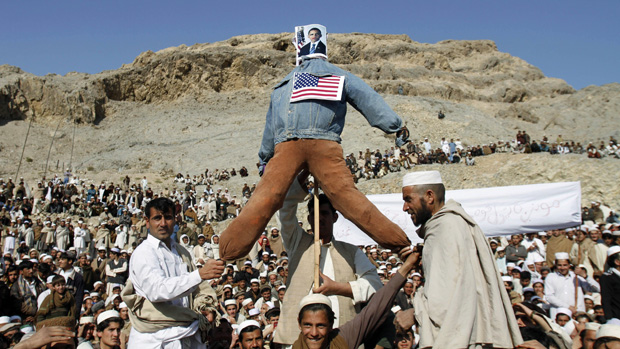 |
| Source: Press TV article "Afghanistan protests to continue until expulsion of US troops" |
Hearts and minds across Afghanistan
were similarly outraged by an insult to Islamic sacred texts. Reports of
workers at the site burning themselves to rescue the Quran from the
flames called to mind Jewish scholars diving into Nazi bonfires to
rescue the Torah. As word spread of the “mistake” and apologies
were issued, violent outbreaks rolled across the country. The latest
occurred yesterday when a literacy teacher at a military base for
both NATO and Afghan troops opened fire, killing
two foreign soldiers and wounding another. The preceding week saw
riots
resulting in U.S. troop deaths, an attack on U.S. citizens inside the Afghan interior ministry, an attack on a UN building, and a populace so aroused that President Karzai dared not
rebuke them -- as he was called upon by his NATO “allies” to do.
Afghan Youth Peace Volunteers have published
a critique of the sidelining of Afghan people from official
negotiations which have the stated aim of winding down combat
operations in their country. An excerpt:
If a war was being waged in the U.S. we would expect Americans to demand an end to the war and to have a say as to how it should end.
Likewise, the people of Afghanistan want to have a say in the negotiations to end the Afghan war.
After all, in 2011, a record number of 3021 Afghan civilians lost their lives. Afghans who risk losing their lives should have a say in the negotiations, ironically engineered by the very players who are killing them ( the UN reported that ‘anti-government elements’ – the Taliban and other insurgent groups – were responsible for 77 per cent of conflict-related deaths in 2011, while 14 per cent were caused by ‘pro-government forces’ – Afghan, U.S. and international security forces ).
But, fatally, the 30 million people of Afghanistan have no say in these negotiations. They are not represented at the negotiation table.
 |
| Source: Antiwar.com article by Kelley B. Vlahos |
Of course the interests of U.S. people aren't represented at the imperial negotiating table, either. The decade long remote control war with its emblematic weapon, the Unmanned Aerial Vehicle (UAV), or drone, manufactures its own enemies and is hugely expensive. But no hearts and minds are needed to contribute to the effort. Just file your 1040 on time -- or else.
1 comment:
The Afghan people will be told when they have matured sufficiently to bear the awesome responsibilities of self-government. We are presently inquiring into how to communicate this to them should they achieve that maturity. We are exploring the notion that a failure to communicate effectively in English may not in itself be proof that they have not thus matured. But this raises the question of how such communication can be carried out. If we employ a local translator, what guarantee do we, the international community, have that he/she is translating honestly?
If you have any suggestions, please call the White House and ask for Barry.
Post a Comment